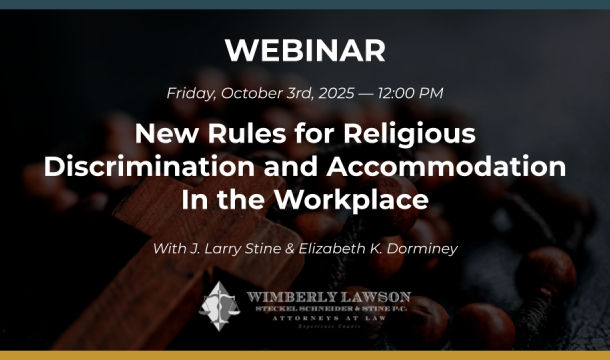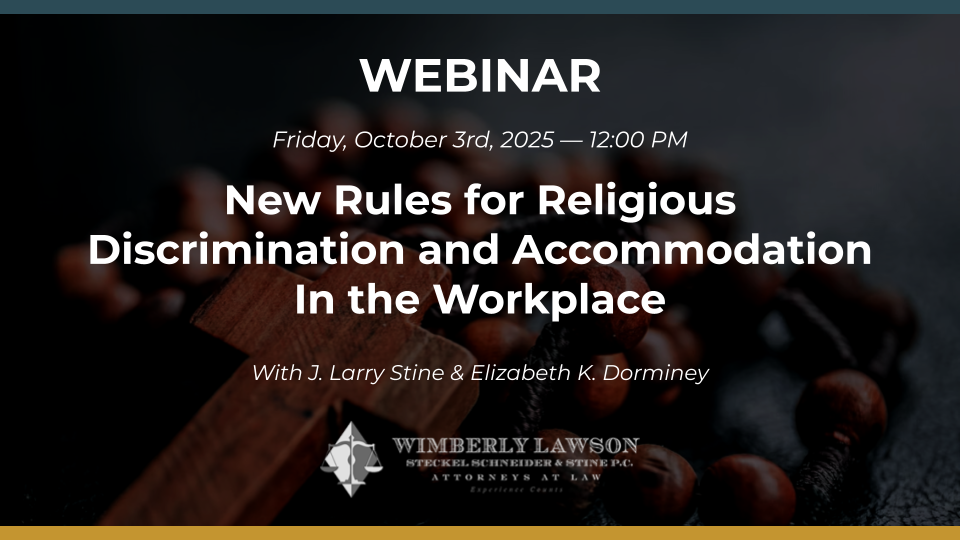Religious Accommodation: What is Reasonable? The Tenth Circuit Rejects the EEOC’s Proposed Standard.
This week, the Tenth Circuit Court of Appeals issued a decision in a case that involves workers who cannot work on certain days for religious reasons, and how an employer should go about accommodating such religious practices. The case, Tabura v. Kellogg USA, 10th Cir., No. 16-4135 (January 17, 2018), was filed by two Kellogg USA workers, who are Seventh-day Adventists, who said they were fired for not working Saturday shifts. The accommodation offered by Kellogg was a policy that allowed them to swap shifts with other workers. However, Kellogg assessed disciplinary points against any employee who missed part or all of a scheduled work day without taking paid time off or trading shifts with another employee. The plaintiffs were unable to find workers who would swap shifts with them, and eventually, they were terminated for missing too much work.
The lower court granted summary judgment in favor of Kellogg, and the Tenth Circuit reversed.
The case caught the attention of the EEOC, and the EEOC filed a brief in support of the plaintiffs. In its brief, the EEOC argued that the accommodation offered by Kellogg was not reasonable, and it further argued that to be reasonable, an accommodation must "eliminate" the conflict between the employee's religious practice and his work requirements. The Court rejected the EEOC's proposed rule, finding instead that the question of whether an accommodation is reasonable must be made on a case-by-case basis, grounded on the specific facts presented by a particular situation. The Tenth Circuit remanded the case back to the district court because it was unclear whether Kellogg satisfied its obligation to accommodate the workers' religious practices due to the disputed facts surrounding the difficulty the plaintiffs had in arranging voluntary swaps with other, qualified employees.
The takeaway: Title VII requires that an employer, short of undue hardship, make reasonable accommodations to the religious needs of its employees. "Accommodate . . . means . . . allowing the plaintiff to engage in her religious practice despite the employer's normal rules to the contrary." EEOC v. Abercrombie & Fitch Stores, Inc., 135 S. Ct. 2028, 2032 (2015). This is not a "one size fits all" rule. Ultimately, reasonableness is a fact-specific determination.
Relevant factors may include the type of workplace, the nature of the employee's duties, the identifiable cost of the accommodation in relation to the size and operating costs of the employer, and the number of employees who will in fact need a particular accommodation.
Some common methods of religious accommodation in the workplace include the following:
- Scheduling Changes, Voluntary Substitutes, and Shift Swaps
- Changing an employee's job tasks or providing a lateral transfer
- Making an exception to dress and grooming rules
- Use of the work facility for a religious observance
- Accommodations relating to payment of union dues or agency fees
- Accommodating prayer, proselytizing, and other forms of religious expression
Ultimately, the determination of whether and how an employer can accommodate an employee's sincerely held religious beliefs requires the balancing of many factors. We recommend that these decisions be made in consultation with qualified employment counsel.

Kathleen J. Jennings is a former principal in the Atlanta office of Wimberly, Lawson, Steckel, Schneider, & Stine, P.C. She defends employers in employment matters, such as sexual harassment, discrimination, Wage and Hour, OSHA, restrictive covenants, and other employment litigation and provides training and counseling to employers in employment matters.
Related Content
Get Email Updates
Recent Content

Trump Nominates Appointments to NLRB and EEOC but Policy Changes Likely to Be Delayed

DOL Launches Self-Audit Programs Designed to Help Employers Improve Compliance

DOL Must Release EEO-1 Reports to the Public under Open Records Laws

Current Advice on Active-Shooter Situations

New Policy for Federal Workers and Religious Expressions

